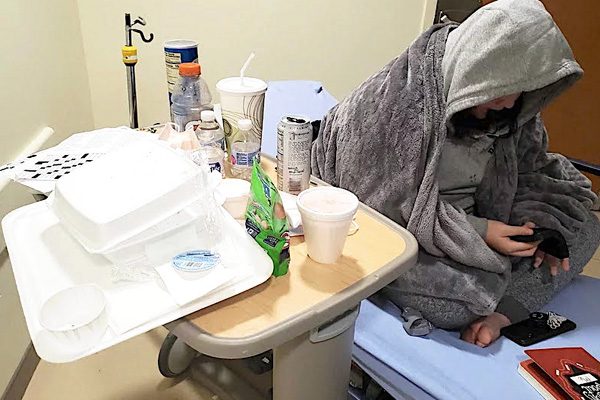DESPERATE –
June 23, 2021 – Emergency rooms are not typically places you check in for the night. If you break an arm, it gets set, and you leave. If you have a heart attack, you won’t wait long for a hospital bed. But sometimes if your brain is not well, and you end up in an ER, there’s a good chance you will get stuck there. Parents and advocates for kids’ mental health say the ER can’t provide appropriate care and that the warehousing of kids in crisis can become an emergency itself. What’s known as emergency room boarding of psychiatric patients has risen between 200% and 400% monthly in Massachusetts during the pandemic. The CDC says emergency room visits after suicide attempts among teen girls were up 51% earlier this year as compared to 2019. There are no current nationwide mental health boarding numbers.
I met Melinda in early April, on her 12th day in the ER. Doctors were keeping her there because they were concerned that she’d harm herself if she left. Many parents report spending weeks with their children in hospital hallways or overflow rooms, in various states of distress, because hospital psychiatric units are full. While demand is up, supply is down. COVID-19 precautions turned double rooms into singles or psych units into COVID units. While those precautions are beginning to ease, demand for beds is not. Inside her small room, Melinda was disturbed by cameras that tracked her movement, and security guards in the hallways who were there, in part, for her safety. “It’s kinda like prison,” she says. “It feels like I’m desperate for help.”
Desperate is a word both Melinda and Pam use often to describe the prolonged wait for care in a place that feels alien. But this experience is not new. This was Melinda’s fourth trip to a hospital emergency room since late November. Pam says Melinda spiraled downward after a falling out with a close family member last summer. She has therapists, but some of them changed during the pandemic, the visits were virtual, and she hasn’t made good connections between crises.
“Each time, it’s the same routine,” says Pam. Melinda is rushed to an ER where she waits. She’s admitted to a psych hospital for a week to 10 days and goes home. “It’s not enough time.”
Pam says each facility has suggested a different diagnosis and adjusted Melinda’s medication.
“We’ve never really gotten a good, true diagnosis as to what’s going on with her,” Pam says. “She’s out of control, she feels out of control in her own skin.”
Melinda waited six months for a neuropsychiatric exam to help clarify what she needs. She finally had the exam in May, after being discharged from the psychiatric hospital, but still doesn’t have the results. Some psychiatrists say observing a patient’s behavior is often a better way to reach a diagnosis.



